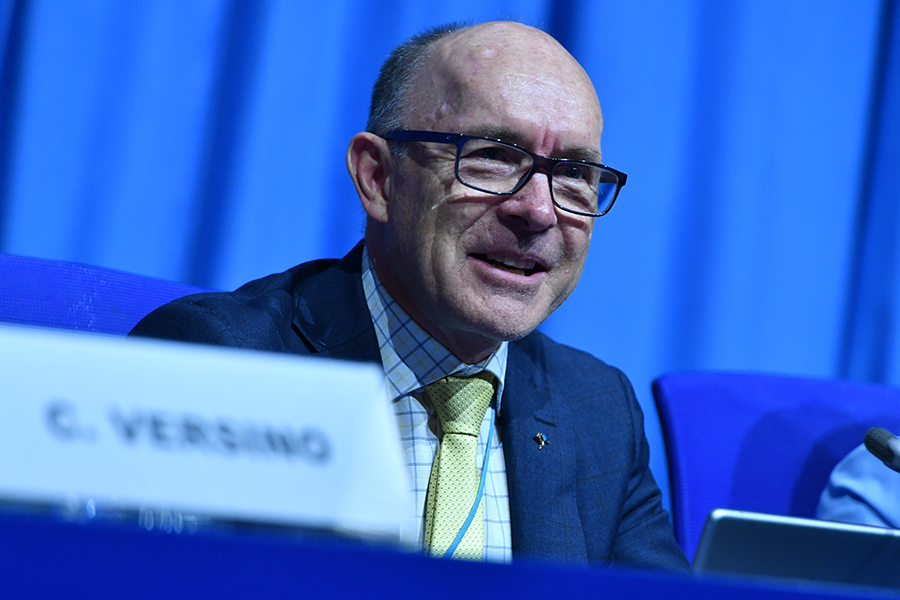States Fail to Agree on CTBTO Leader
January/February 2021
By Daryl G. Kimball
After nearly five months of discussion and sometimes intensive debate, the member states of the Comprehensive Test Ban Treaty Organization (CTBTO) failed on Dec. 18, by one vote, to elect Robert Floyd of Australia as the agency’s next executive secretary.
 In the fifth round of balloting, Floyd secured 91 votes, with 46 voting against, and 3 abstentions from the 141 member states that had paid their dues and had full voting rights. The chair of the meeting ruled that Floyd was one vote short of the two-thirds majority required under the rules established for the selection of the executive secretary.
In the fifth round of balloting, Floyd secured 91 votes, with 46 voting against, and 3 abstentions from the 141 member states that had paid their dues and had full voting rights. The chair of the meeting ruled that Floyd was one vote short of the two-thirds majority required under the rules established for the selection of the executive secretary.
With the incumbent executive secretary, Lassina Zerbo, who was also on the ballot, failing to secure a simple of majority of votes among the member states for a third term, the nomination slate is wiped clean, and states can nominate or renominate candidates until Feb. 5. The eventual winner will lead the organization after July 31, 2021, when Zerbo, who is from Burkina Faso, will have completed his second four-year term.
Following the inconclusive outcome of the December voting in Vienna, Floyd told Arms Control Today on Dec. 30 that he expects his government to nominate him as a candidate for the executive secretary position.
According to multiple diplomatic sources, the vote was affected by lingering grievances over the contentious debate in October about how to resolve a dispute over which states-parties that are in financial arrears to the organization are eligible to vote to select the organization’s executive secretary. (See ACT, November 2020.)
The organization has an annual budget of approximately $128 million that comes from member state contributions assessed on the UN dues scale. In 2020 a relatively larger number of states fell behind in paying their assessed dues in part as a result of the economic impacts of the COVID-19 pandemic.
According to the rules, nations that have extensive arrears lose their voting rights. In the weeks leading up to the executive secretary election, several European states, including some backing Floyd, were adamant that only those states that have met their financial obligation should be entitled to vote, while others, particularly from Africa, pressed for a more liberal approach.
How the unresolved leadership selection process will affect the organization and cooperation among states-parties is not yet clear. Because the next round will take place in a new fiscal year, many states that had previously paid their assessed dues to the organization and were eligible to vote may not be in the same position in 2021.
Floyd, who is currently Australia’s director for safeguards, said in November that, as executive secretary, he “would lead for all states across all regions [and] will work together to make progress on gender balance, with a substantial internship program for women; address geographic balance; and promote an internal culture of trust, cooperation, and collaboration.”
The CTBTO executive secretary is responsible for leading the organization’s work to maintain and operate the treaty’s global verification regime in preparation for the treaty’s entry into force, as well as promoting its entry into force. The Comprehensive Test Ban Treaty (CTBT) has been signed by 184 states and ratified by 168. But there are eight holdout states—China, Egypt, India, Iran, Israel, North Korea, Pakistan, and the United States—that must still ratify to trigger the formal entry into force of the 1996 treaty.
One major challenge for the leader of the CTBTO will be to maintain the International Monitoring System and International Data Center infrastructure in what will likely be a time of fiscal constraint. Another challenge will be to find effective ways to help CTBT signatory states reinforce the global nuclear test moratorium that has been established by the treaty as tensions remain high between those states that have conducted nuclear test explosions in the past, particularly the United States and Russia.
